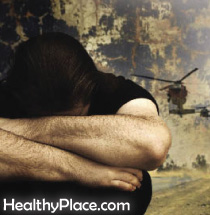Combat PTSD Symptoms – Negative Changes in Beliefs and Feelings
The four categories of posttraumatic stress disorder (PTSD) symptoms are re-experiencing, avoidance, negative changes in thoughts and beliefs and hyperarousal (feeling keyed up). I’ve talked about the first two categories already and, so, today I want to discuss the changes in thoughts and beliefs associated with combat PTSD.
What are the Negative Changes in Thoughts, Feelings and Beliefs?
People have many different psychologies before they head to a combat zone but what’s clear is for the people who return with PTSD, their thoughts, feelings and beliefs are often changed in negative ways.
Self-image is one thing that can be negatively affected by combat PTSD. For example, while people might have had healthy self-images and viewed themselves and their characteristics in a positive light, after returning from combat, they may see themselves negatively, as somehow bad, shameful, guilty, or even evil, often because of things they were required to do or see in combat.
You may also suddenly have negative feelings for those around you. Instead of loving feelings and positive thoughts for your family, you may now feel anger, negativity or even nothing at all.
Finally, you may begin to have negative feelings and hold negative beliefs about the environment or the world at large. You may feel that the world is not fair, some force is “out to get you,” that nothing is safe or that no one can be trusted.
The Impact of Negative Changes in Thoughts and Beliefs
 These changes can have a very detrimental effect on your life and your happiness. Feeling negatively towards the self may convince you that no one could ever love you or that you are not worthy of happiness. This can manifest in the way you act and carry yourself and even contribute to feelings of depression.
These changes can have a very detrimental effect on your life and your happiness. Feeling negatively towards the self may convince you that no one could ever love you or that you are not worthy of happiness. This can manifest in the way you act and carry yourself and even contribute to feelings of depression.
Negative thoughts and feelings for those around you tends to create disharmony in relationships and distance from those you love. Whereas a family might have once been close-knit, you may now find that you choose to spend time outside the family unit or away from friends whenever possible, turning down invitations to be social. This can truly hamper one’s ability to recover from combat PTSD as the support of loved ones can be an integral part of recovery.
Negative thoughts about the environment may change the way you act in public and the way you act towards others. If you are distrustful of everyone, it’s difficult to form, or keep, bonds. If you feel that there is a force “out to get you,” you are always looking for the negative and possible dangers – even when none exist. This fundamentally changes a person’s mindset and tends to make the person very unhappy.
What Can Be Done about the Negative Changes in Thoughts and Beliefs?
Once a person’s thoughts and beliefs become ingrained, it can be hard to change them, but change is possible and it’s often done through therapy. Simply standing up and questioning the reasonableness of some beliefs can help. For example, has your partner done anything to deserve your mistrust? Is your mistrust in your partner unfounded? How can you work to trust your partner again, little by little? Another example might be being confronted with the truth that while bad things do happen in the world to everyone, good things happen too.
Working on things like self-esteem, negative thoughts of the self, feelings of insecurity and a lack of feelings towards loved ones can be complicated, but through treatment, perhaps even treatment for the family, it is possible.
Please see my articles:
- Mindfulness-Based Therapies in Combat PTSD,
- Prolonged Exposure Therapy for Combat PTSD,
- The Place of Medication and Psychotherapy in the Treatment of Combat PTSD and
- Types of Psychotherapy for Combat PTSD
for more information on combat PTSD treatment.
You can also connect with Dr. Harry Croft on his website, Google+, Facebook,Linkedin and Twitter.
APA Reference
Croft, H.
(2014, September 11). Combat PTSD Symptoms – Negative Changes in Beliefs and Feelings, HealthyPlace. Retrieved
on 2026, March 4 from https://www.healthyplace.com/blogs/understandingcombatptsd/2014/09/combat-ptsd-symptoms-negative-changes-beliefs-feelings
